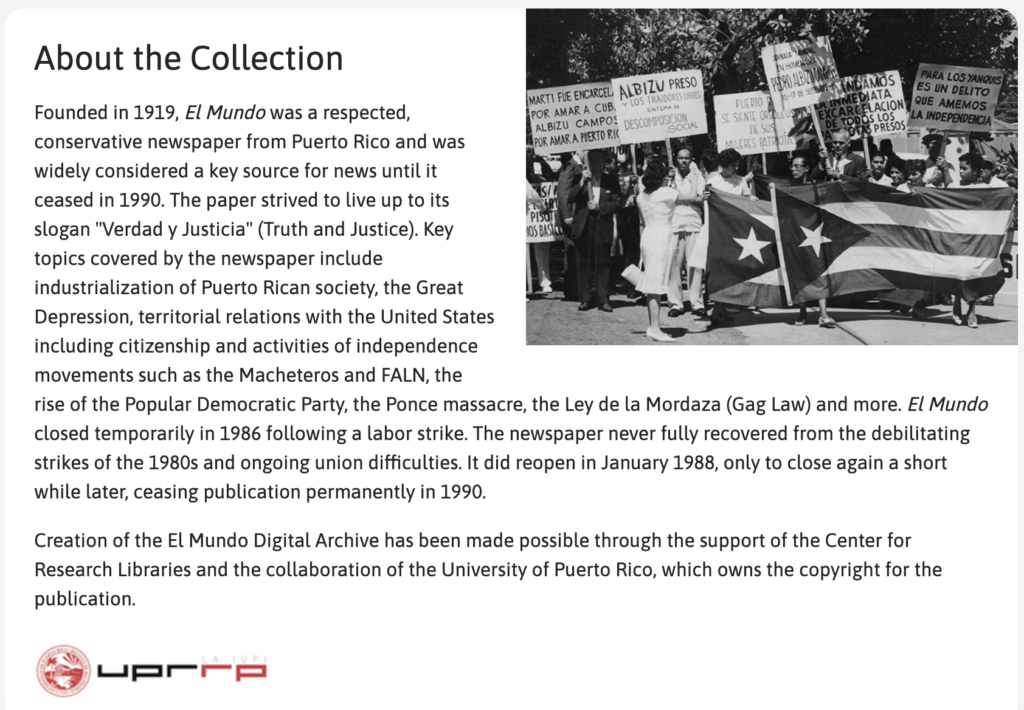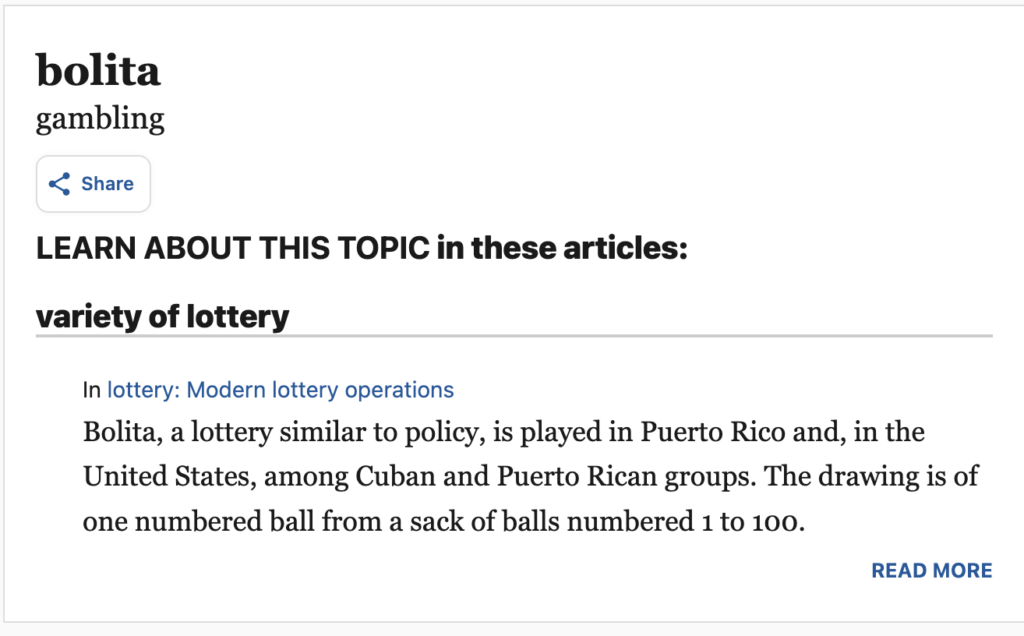Many of the sources we use for research in Puerto Rico are vital records – we use birth, marriage, and death records to learn new names of our ancestors as we climb up genealogical trees. Sometimes we get lucky and find confirmation records (the Catholic sacrament) or church dispensations for marriages of consanguineous relations between cousins which provide us some more detailed information about the social situation for the couple. Given our connection to the United States, we can also rely on census records and war registration draft cards to learn more about our ancestors as well.
Unlike American (read: United States of America) genealogy, for the most part we do not rely on passenger manifests and newspapers to learn much about our ancestors as they are not readily available. However, when the opportunity presents itself, it can open up a new world of information many of us are not used to.
I say this because for most of my initial genealogical research, I was not privy to the use of newspapers for Puerto Rican research. However, as more documents becomes available online, we are able to learn the stories of our ancestors that are told through actual storytelling such as newspaper articles and not just names and dates on a vital record page.
Today I want to focus on the newspaper titled “El Mundo” (The World) and how it helped me to learn and to confirm stories about my ancestors.
Periódico: El Mundo
Personally, I had never heard of or had used the newspaper El Mundo for genealogical research. It was not until it was shared in one of my Puerto Rican genealogical groups that I learned of its existence and was curious of its use for genealogy. Below you can read about how the paper was started, until when it ran, and some of the major events in Puerto Rico it covered.

Research and use of this newspaper was fairly easy, like many searchable websites there is a search engine in which you can type what you are looking for with the ability to select a certain range of searches as well. For exact results place your query in between “quotes” to only get hits for that specific name.
So I decided to try a few names of family members from recent generations seeing as how the years covered where from 1919 to the mid-1980s. This would mean that potentially I would be able to find people in my family that I could not find in “La Gaceta de Puerto Rico“.
I want to focus on three articles today:
(1) One I knew the story for
(2) One that I had no idea about
(3) One that I recently found after examining a death record
Death by Accident
Growing up I always knew about my 2nd great-grandfather’s death. This was because it was my own grandmother’s grandfather who died when she was around 16 years old. He lived at home with my grandmother so she was fairly close with him. Pedro Dávila Ruiz, my 2nd great-grandfather, who was from Yabucoa lived in San Juan with my grandmother and her family at the time of his death.
I knew a lot of the details already in regards to his death: how my 2nd great-grandfather was on a walk with one of his grandsons whose birthday it was. How you could hear the car coming down the street having hit other things along the way. How my 2nd great-grandfather at the age of 79 was able to push his grandson out of the way so he wouldn’t get hit by the car. So when I found the article I was not too surprised because I had grown up having heard this story. Most if not all of the details in the newspaper article coincided perfectly with what my grandmother remembered about her own grandfather’s death.
All three of the deaths in this article had to deal with transit/cars in different parts of the island (Santurce, San Juan, and Naguabo) and from the title you can see that the total death total raised to 390 for auto deaths that year.

Illegal Activities
This article I was surprised to find because I had no idea my great-grandfather got in trouble with the law. My great-grandfather Félix Vélez Mercado (who I had just blogged about in the last blog entry) was from Utuado died fairly young in San Juan, at the age of 48 due to pulmonary tuberculosis. This would mean that Félix was about 43 when this article was published.
The article refers to violations or infractions in regards to “la bolita” (the little ball). I had never heard of this law and barely knew about the game and so I was even more interested by the article. It mentions that on Saturday [26 June 1948], the police of Stop 19 of Santurce, surprised Félix Vélez Mercado on Bilbao Street in Santurce with the material of a ball, occupying three lists of numbers and $4.13 in cash. Others were also caught that same day with this violation and each was sentenced to $2,000 in bail money in order to be freed; each of them was able to provide said bail.


My grandfather in 1940 was listed as a ticket seller and in 1950 as an orange seller. Both of these jobs were listed as ‘ambulante‘ (traveling/wandering) which meant that my great-grandfather had the ability to easily move around while on the job and not look suspicious if he were up to something… which it seems he was.
La ley de bolita
It is important to understand what ‘la ley de bolita’ is and why he was being charged a bail worth a little over $35,000 in today’s money. La bolita is a game that seems to have been majorly cracked down starting around at least the 1930s based on articles in El Mundo when “la bolita” was referred to as a “clandestine” and “prohibited” game. What’s funny is that one article in 1935 mentions a promise of the complete removal and disappearance of this game from the island which kept appearing in articles in El Mundo even in the 1980s – so much for good riddance!
However, none of the articles I could find defined the game – Britannica sums it up nicely!

So it seems that when my great-grandfather was caught “with the material of a ball, occupying three lists of numbers and $4.13 in cash” he was likely going around selling numbers for people to bet on like a modern day lotto and had money from those who had placed bets on certain numbers.
This is something I definitely would have never discovered via vital records!
Another Accident
This article I discovered after doing some regular genealogical research. After discovering my great-grandmother had an uncle living in San Juan for whom she was a godmother for one of his children, I wondered if I would be able to find his death certificate in San Juan as well.
The person in question is Ramón González, son of Antonia González who was from Lares like Rosalía and the brother of Rosalía’s mother Dionisia González. Ramón, also known as Juan Ramón Padilla González, died on the 21 August 1955 in Santurce, San Juan, Puerto Rico. Though the mother is incorrectly listed as “Ramona González” I know this is the same Ramón because the address is the same as he was listed in living at on the 1950 census.
Reading his death record for the cause of death I saw that it mentioned “accidente por automóvil” (car accident). Seeing as how my 2nd great-grandfather’s death was recorded in El Mundo, also a car accident, I wondered if Ramón’s would be listed as well.
To my surprise, his death was listed in El Mundo and was able to provide me more information on how he was killed.

Similarly to Pedro Dávila Ruiz’s death, Ramón was hit by an oncoming car and subsequently killed, he was only 54 years old (though the article mentions he was younger). The article of course mentions more information about his death that his death certificate could not provide.
It mentions that a Korean War veteran who had a limited license (given his left leg was amputated) hit Ramón who was leaning against a cement pole on Muñoz Marín Avenue. The veteran was only 31 years old himself and was speeding which is what likely caused him to lose control of the vehicle and caused the crash. The veteran was accused of involuntary manslaughter and posted a bail of $2,000.
The Importance of Storytelling
In a separate yet related tangent, this is why storytelling and talking about our ancestors is important. For starters, it keeps their names alive but also we get to learn stories about who they are outside of the vital information.
A lot of the stories I have about my maternal family are from my grandmother who told me stories of her family’s life back in Yabucoa and her life growing up in San Juan. My maternal grandfather mainly told me about the pride he felt for being afro-Boricua and his roots. Little did I know this would be an important clue to his origins.
Meanwhile, on my dad’s side I have stories of my paternal grandmother’s family’s life in the mountain town of Lares as farmers and also about their move to San Juan. Unfortunately, I do not have many stories from my paternal grandfather’s side since I only got to meet him once or twice but I do have a few stories my dad knew from his youth his great-grandmother with whom he was able to spend time with. Hopefully as more information becomes available online, I will be able to learn some stories about my paternal grandfather’s side of the family.
So keep searching because you never know what you will find!

